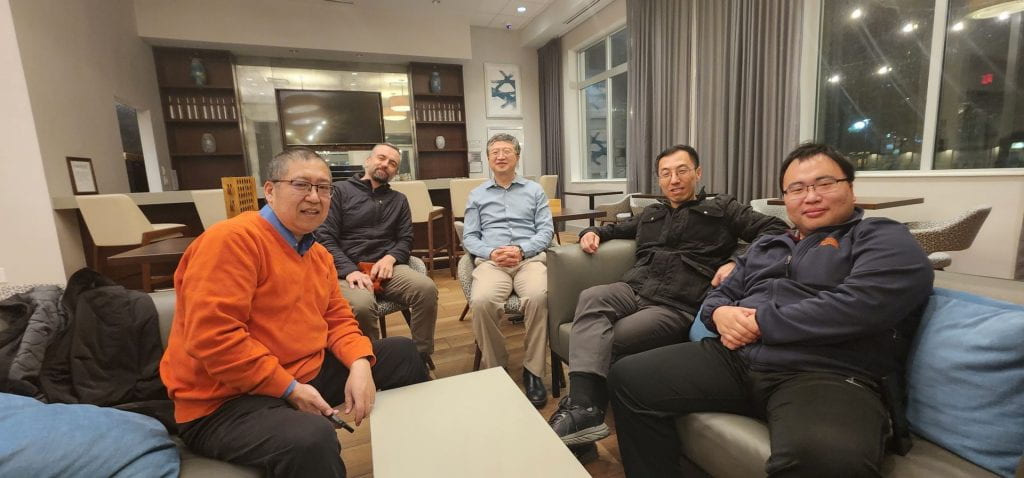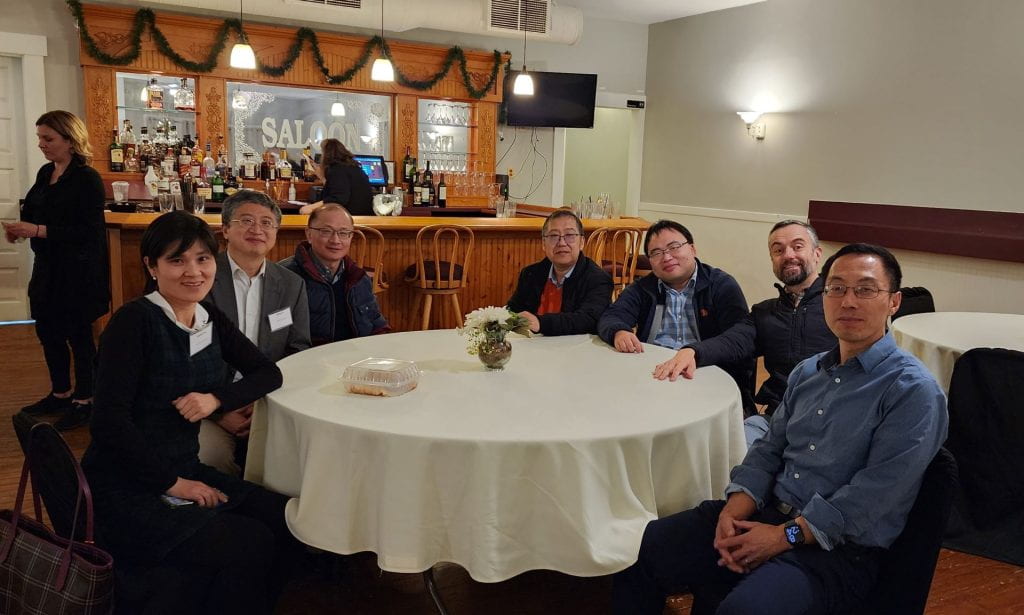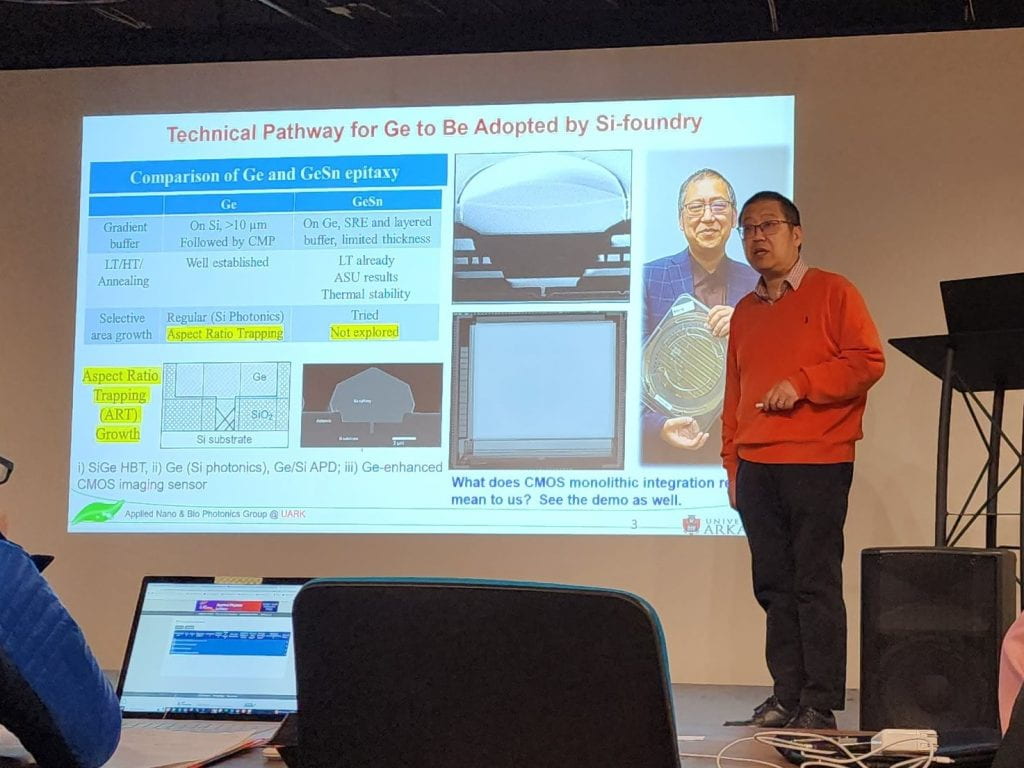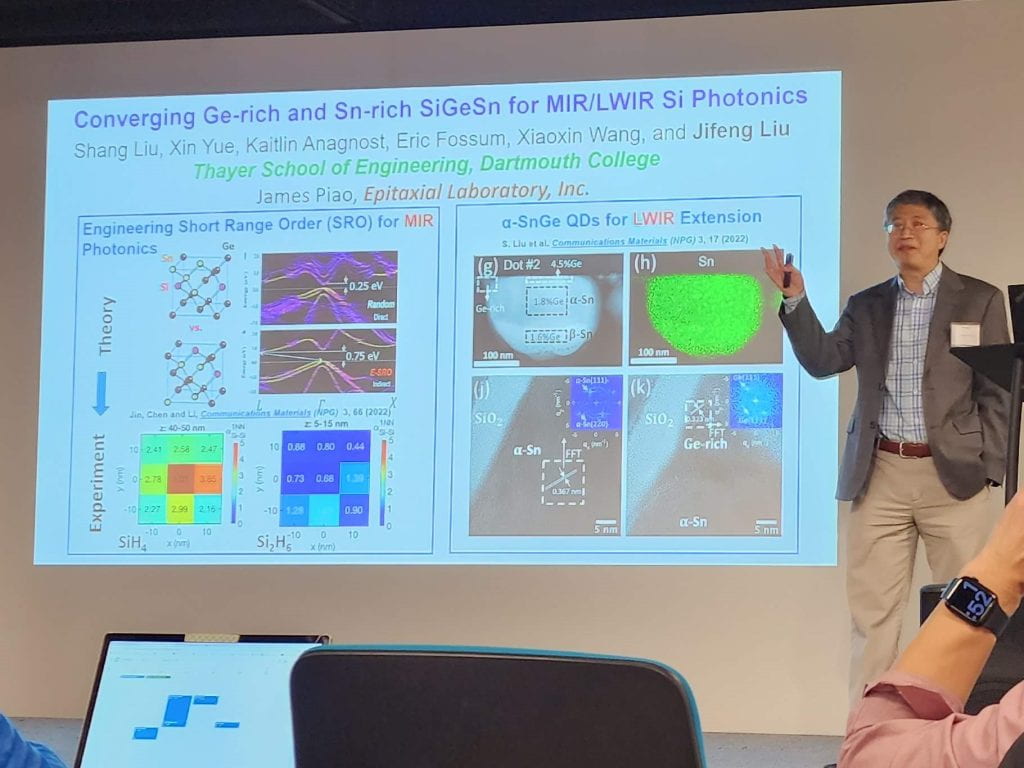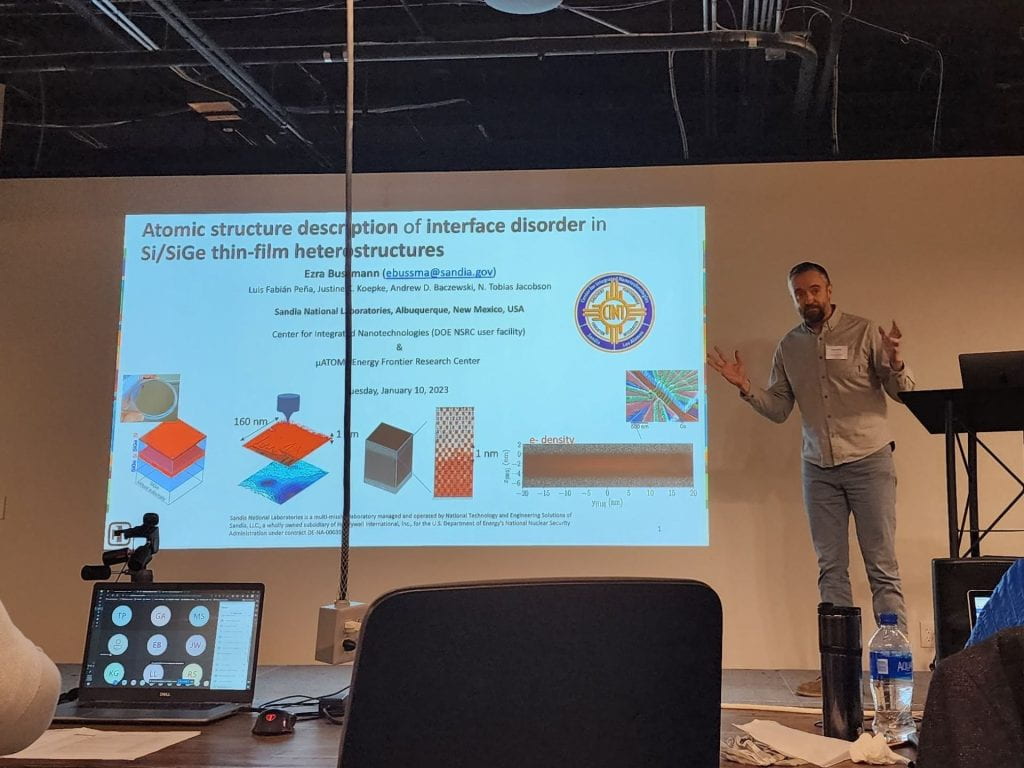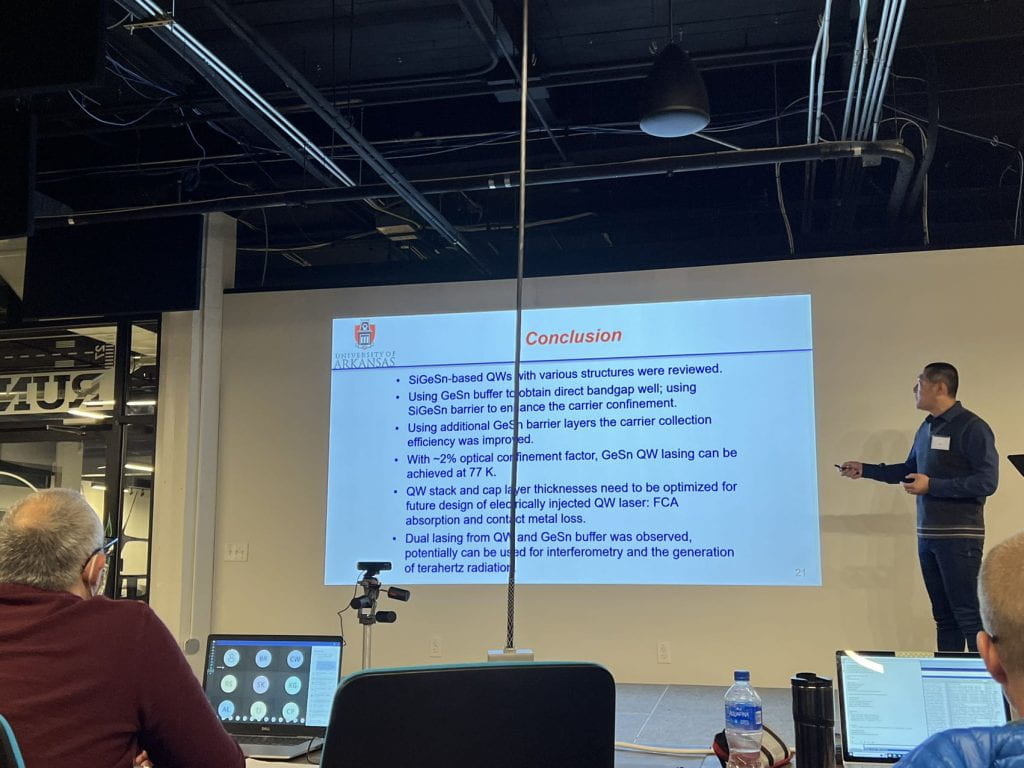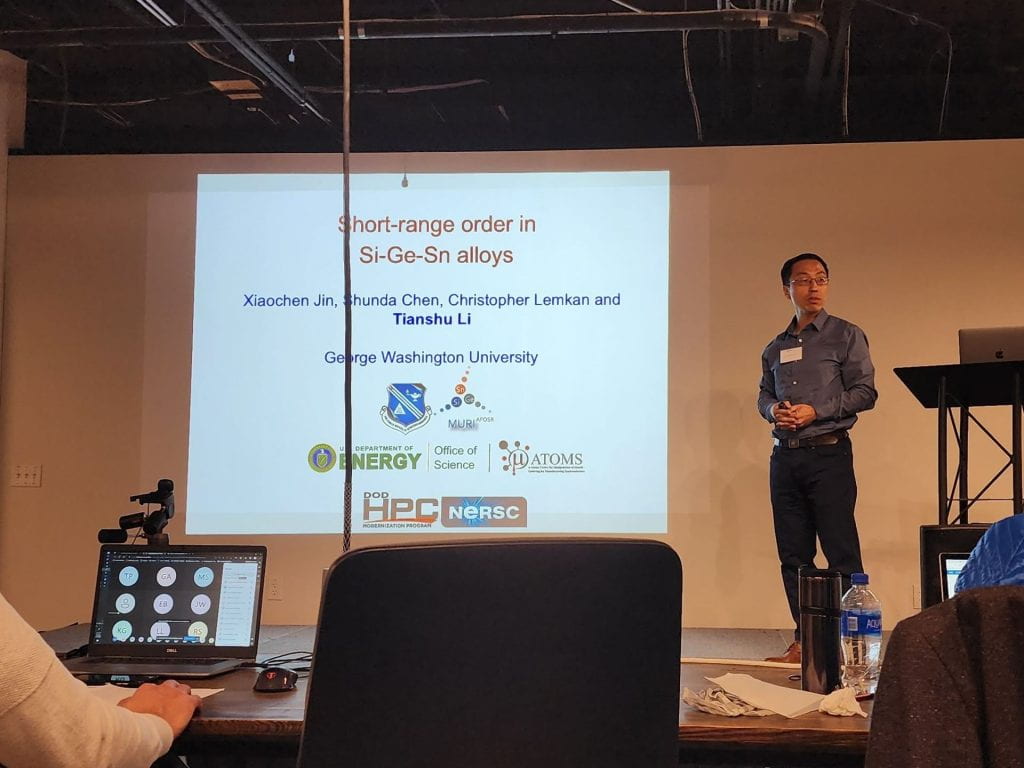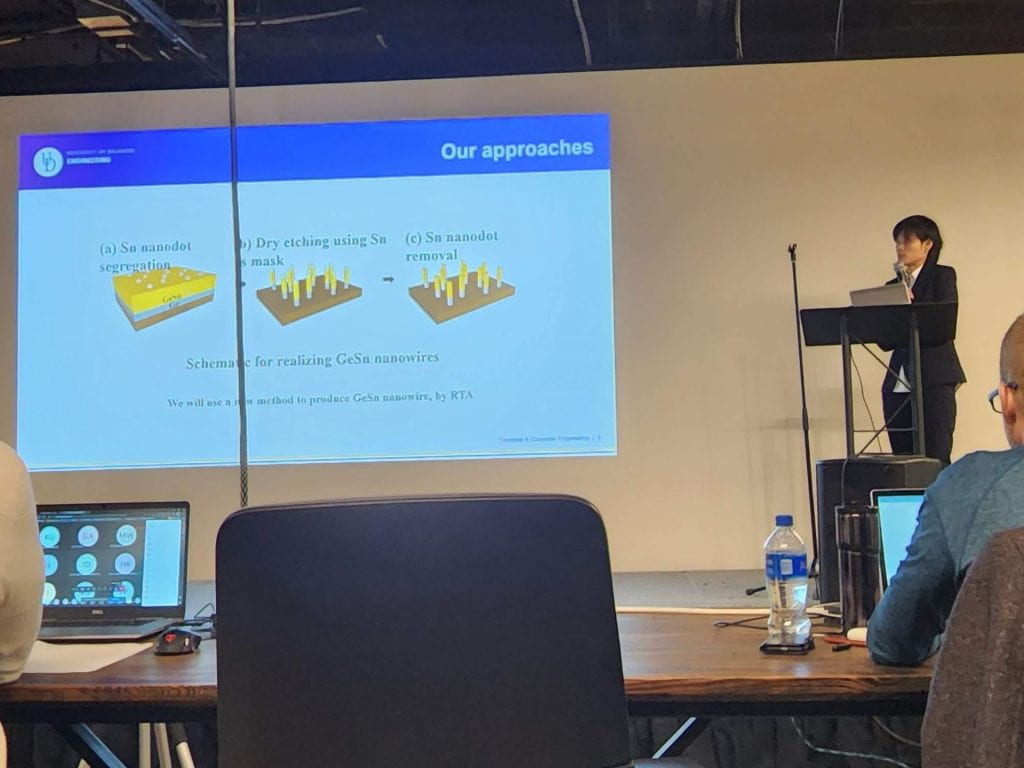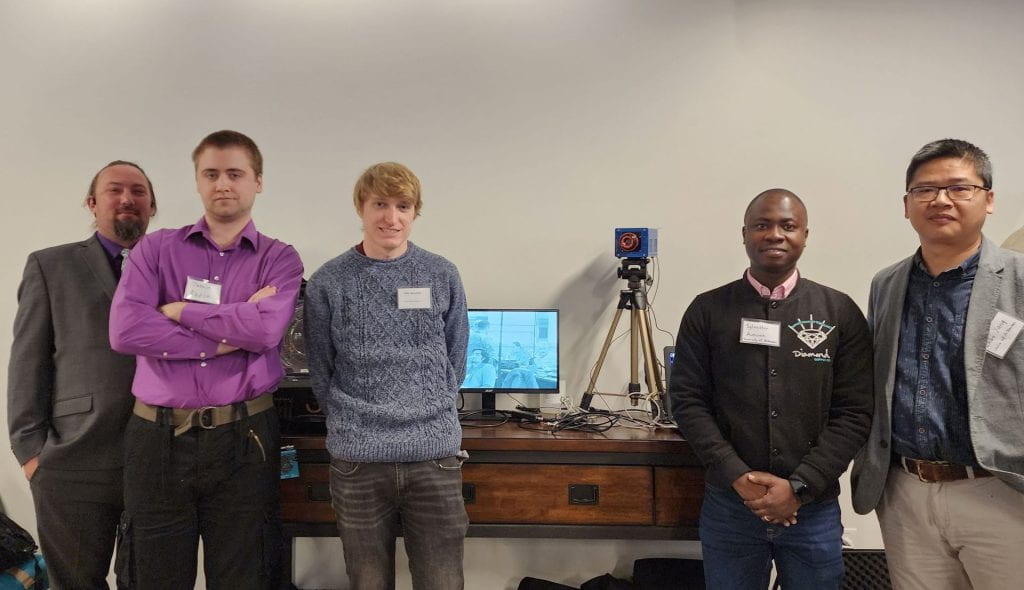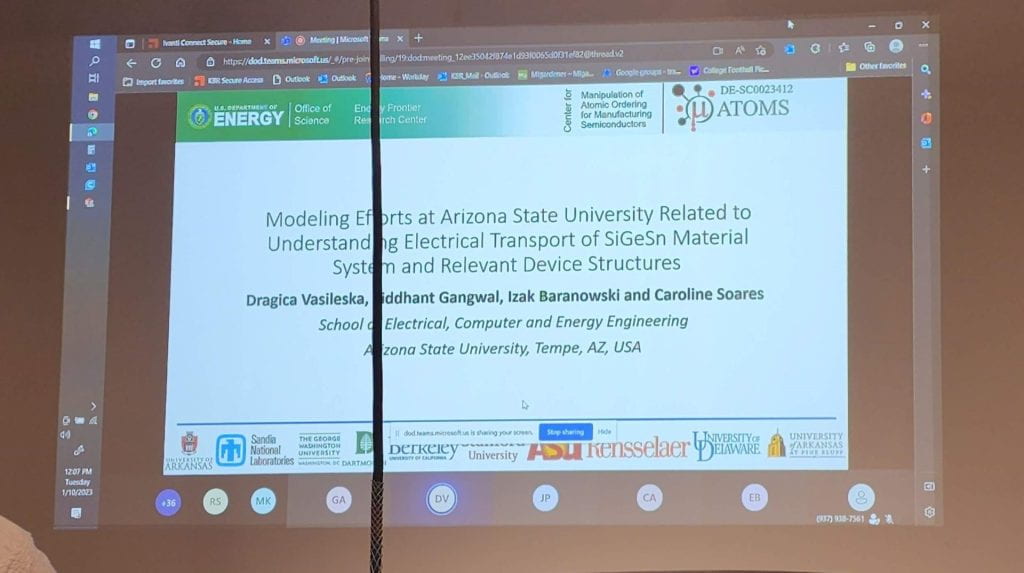
November 2025: The teams latest research paper titled, “High Mobility and Electrostatics in GeSn Quantum Wells with SiGeSn Barriers” was featured on the cover for the Advanced Electronic Materials: Volume 11, Issue 19. More details on the research and the teams collaborative efforts can be found in the Arkansas News announcement.

October 2025: Five recipients were awarded Best Poster at the 2025 µ-Atoms EFRC meeting. They are from left to right: Haochen Zhao (University of Delaware), Xianchao Dong (George Washington University), Ram Joshi (University of Arkansas), Manish Sharma (University of Arkansas), and Hanzhi Shang (Rensselaer Polytechnic Institute).
University of Arkansas hosts third annual µ-Atoms EFRC meeting
The µ-ATOMS team held its third annual all team meeting in Fayetteville, Arkansas October 26th-28th. This year’s meeting highlighted the teams new discoveries in Atomic Ordering, with results published in Science, along with plans for the renewal phase. Photos shown include a group photo, results from the poster session and various talk overviews.
Atomic Ordering Discovery Opens Avenues for Semiconductor Design

September 2025: Members from the µ-Atoms EFRC traveled to attend the 8th Tri-Service Workshop on GeSn and SiGeSn. The workshop brought together diverse groups working with group IV materials to develop this system and make this technology commercially available.

September 2025: A team led by Dr. Andrew Minor with the Lawrence Berkeley National Laboratory has published the following in Science- Identification of short-range ordering motifs in semiconductors. Berkeley Labs wrote this article explaining the research and the team’s novel discoveries. Atomic Neighborhoods in Semiconductors Provide New Avenue for Designing Microelectronics. The image shown depicts an illustration of the semiconductor material investigated for this study, which is composed of germanium with small amounts of silicon and tin. The germanium atoms are depicted as gray spheres, the silicon as red and tin as blue. (Credit: Minor et al/Berkeley Lab).

August 2025: Members of the µ-Atoms team traveled to Washington, D.C. to present at the EFRC PI Meeting. Dr. Paul McIntyre (Stanford) and Dr. Jifeng Liu (Dartmouth College) both gave talks while others presented technical posters highlighting the center and its research.


July 2025: Register for the upcoming BES Early Career Network Fireside Chat with Dr. John Mauro. Event will be held virtually on July 8th from 4-5 PM EDT.

May 2025: Outstanding U.S. Doctoral Students selected for Department of Energy Office of Science Graduate Research Program.
Steven Akwabli was selected to be a participant of the prestigious Office of Science Graduate Student Research (SCGSR) program. Congratulations Steven!

April 2025: Xiaochen Jin, with George Washington University, successfully defended her doctoral dissertation on April 30th, 2025.

April 2025: Haochen Zhao, with the University of Delaware, successfully defended his Ph.D. on April 2nd, 2025.

March 2025: We are thrilled to announce Dr. Tyler McCarthy has joined the Teledyne Space Imaging team as a molecular beam engineering (MBE) growth production engineer. During his tenure at Arizona State University (ASU) as a PhD student, Dr. McCarthy was the project manager for the EFRC program, focusing on MBE growth of SiGeSnPb alloys. Research highlights include growth of α-SnGe on InSb substrates with a semi-insulating CdTe buffer for quantum transport measurements, the first reported MBE growth of GePb alloys and the first reported MBE growth of SiGeSn superlattices (SL). This work has resulted in 4 publications, 7 conference presentations (1 international) and 1 PhD dissertation. Dr. McCarthy was a member of the junior advisory committee (JAC) representing Thrust 2 throughout his tenure and served a term as the inaugural DOE basic energy sciences (BES) early career network (ECN) representative for the u-ATOMs program. Dr. McCarthy is excited to utilize the skills he developed working as a representative in a multi-disciplinary/team project and is thankful for all the help and experience provided by the EFRC.

December 2024: Dr. Shunda Chen’s research was highly recognized at the Research and Development Exhibition at the School of Applied Science and Engineering (celebrating its 140th anniversary), George Washington University. He received the First Place Civil and Environmental Award and Best Poster Presentation Award.

December 2024: Xiaochen Jin’s poster on statistical APT analyses was nominated for Best Poster Award at the Materials Research Society Conference. She is advised by Dr. Tianshu Li.
Shunda Chen wraps up term as BES Early Career Network Representative
“Serving as a BES Early Career Network (ECN) Representative was both rewarding and fulfilling. I deeply appreciated the opportunity to represent our µ-ATOMS EFRC and connect BES-ECN with our Junior Advisory Committee (JAC) at µ-ATOMS. One of the highlights was leading the Reps Discussion on Scientific Leadership, which sparked meaningful conversations about the essential skills and qualities for effective leadership, as well as strategies to empower emerging leaders to push the boundaries of energy science. I also had the chance to help organize a Reps Discussion on ‘Diversity, Equity, and Inclusion: Recruiting, Retaining, and Belonging,’ which emphasized the critical role diverse perspectives play in driving innovation. These experiences not only strengthened my leadership skills but also underscored the importance of diverse and inclusive community support in advancing energy science. The guidance of BES program manager Dr. Robin Hayes, along with the diverse perspectives and collaboration of the BES-ECN Reps, made this one of the most rewarding and enjoyable experiences for me, and I am truly grateful for it. I look forward to sharing these experiences and continue striving for excellence, empowering future leaders to advance energy science.” -Shunda Chen 2023-2024.

September 2024: µ-ATOMS team members and external collaborators gathered for the 7th annual Tri-Service workshop on Sep 16th-17th in Colorado Springs, CO. The workshop brought together different communities working with group IV materials.

August 2024: Postdoc Priyanka Petluru wins Sandia National Labs seed project to test ion-implanted GeSn for photosensors.
µ-ATOMS’ Priyanka Petluru and Adelaide Bradicich (Sandia/CINT) will demonstrate a high quality thin-film GeSn mid-wave infrared (MWIR) detector through Sn ion implantation into Ge. The MWIR (3-5 µm) has high national security importance with applications including sensing and infrared imaging. Currently, MWIR detectors are dominated by HgCdTe materials, though there are concerns regarding their environmental toxicity. GeSn is compatible with existing Si photonics processes, significantly bringing manufacturing costs down. Increasing the Sn concentration pushes the detection ability of GeSn to longer wavelengths, though high Sn has a detrimental impact on optical quality. The work will utilize ion implantation to demonstrate high-Sn GeSn MWIR detectors without sacrificing optical quality.
This work is supported by Sandia’s Laboratory Directed Research and Development program and performed in part at Center for Integrated Nanotechnologies, a DOE Office of Science User Facility. Sandia is managed and operated by NTESS under DOE NNSA contract DE-NA0003525.
µ-ATOMS team holds second all team annual meeting in Albuquerque, New Mexico
The µ-ATOMS team held its second all team conference and annual meeting in Albuquerque, New Mexico August 26th-28th as an opportunity to bring team members, collaborators, and external advisors together and share insights on the project. This year’s meeting highlighted talks with collaborators from Sandia National Laboratories, Los Alamos National Laboratories, the University of New Mexico and the University of California-San Diego.
June 2024: Dr. Dragica Vasileska (Arizona State University) has been selected as a Fulbright Specialist and will spend 4 weeks at the Technical University of Vienna, Austria in the Institute for Microelectronics.
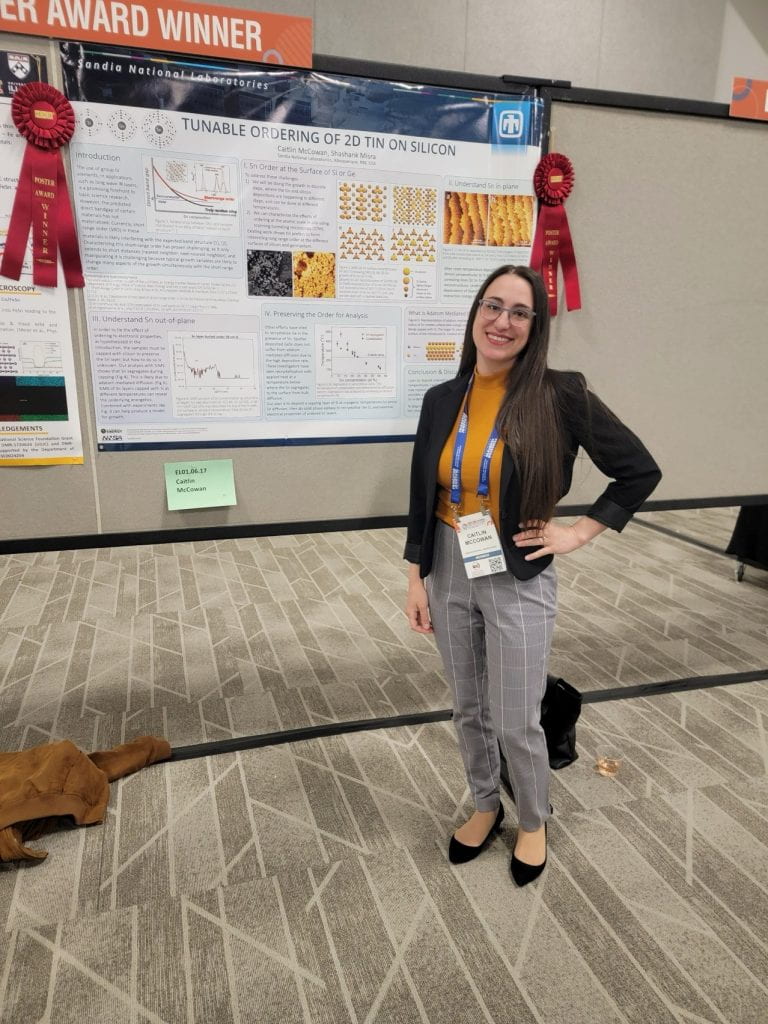
April 2024: Postdoctoral researcher Caitlin McCowan was awarded the 2024 MRS Spring Meeting Best Poster Award for her poster titled “Tunable Ordering Of 2D Tin On Silicon”.
Congratulations to Spring 2024 graduates Shang Liu and Siddhant Gangwal!
Shang Liu will graduate from Dartmouth College with his Ph.D. He successfully defended his thesis titled “Germanium-tin on silicon for integrated photonics and integrated quantum materials”. Siddhant will graduate from Arizona State University with a Masters and will continue to work on his Ph.D. following graduation. His research focus has been on modeling electronic properties for group IV alloy (Si-Ge-Sn-Pb) material systems and developing transport models (path integral implementation of BTE) for nanodevices.
DOE’s Office of Science Is Now Accepting Applications for Fall 2024 Undergraduate Internships
Students will conduct research and technical projects at National Laboratories. The application deadline is May 22, 2024, at 5:00 p.m. ET. More information can be found here.
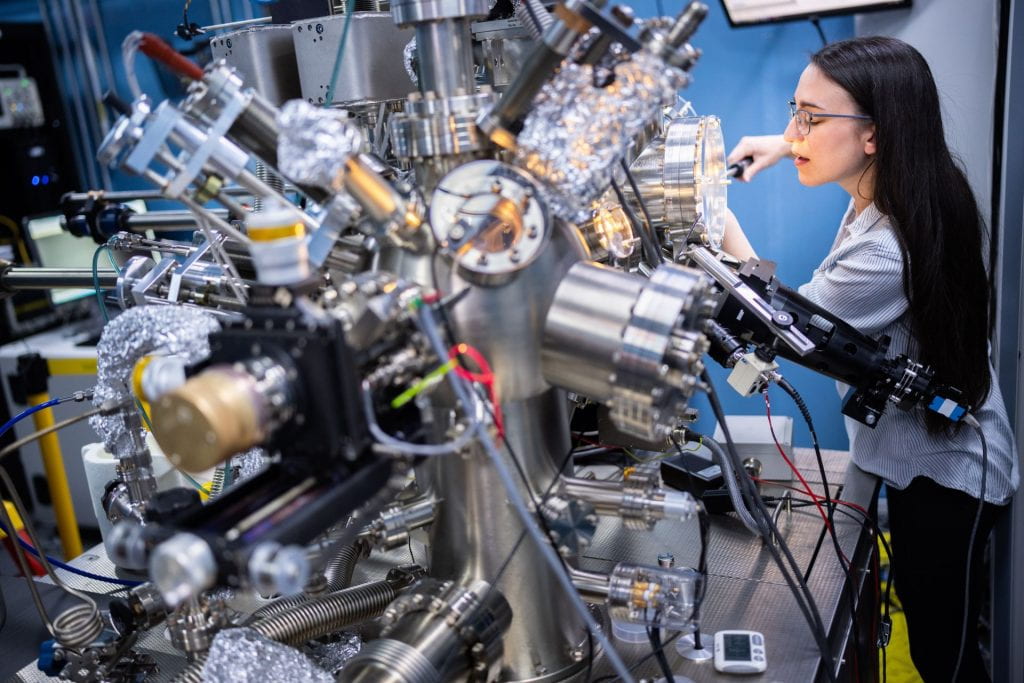
February 2024: Postdoctoral researcher Caitlin McCowan is featured in the Sandia Labs News release with a highlight on her research at the atomic level. (Photo by Craig Fritz)
µ-ATOMS members attend the 6th Annual Tri-Service Workshop on GeSn and SiGeSn
µ-ATOMS team members and external collaborators gathered for the 6th annual Tri-Service workshop on October 25th-26th in Colorado Springs, CO. Hosted by ONR, the workshop brought together different communities working with group IV materials.
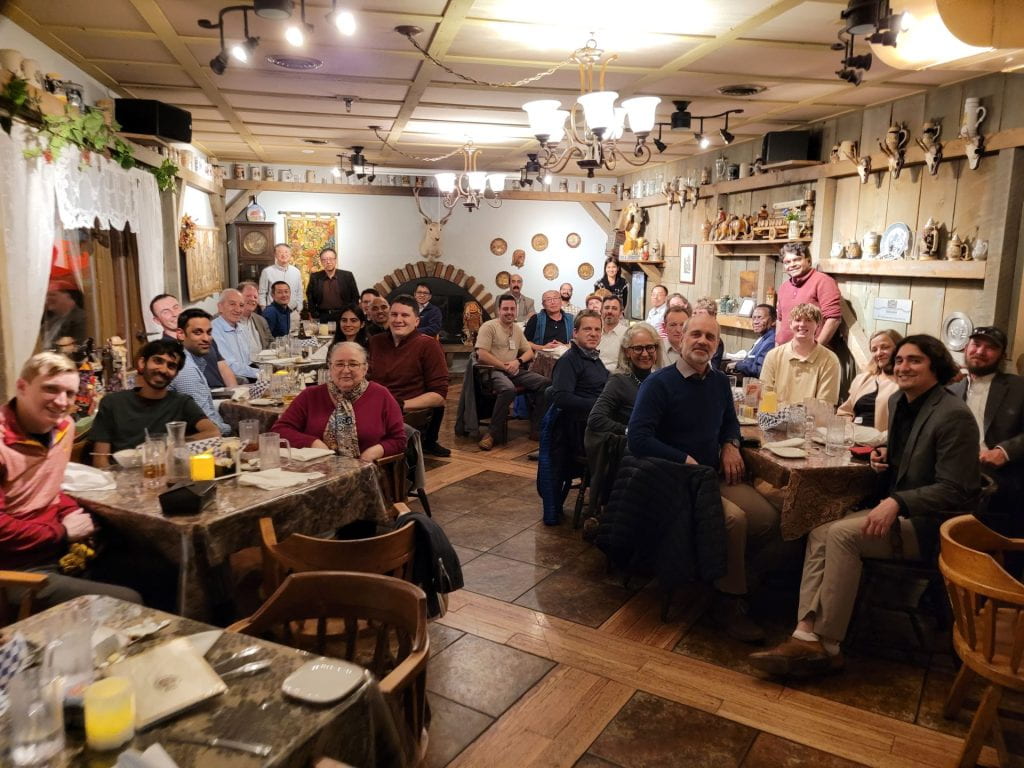
Empowering Future Leaders: Unveiling the Mysteries of Semiconductor Alloy Ordering at the µ-ATOMS Center
The Manipulation of Atomic Ordering for Manufacturing Semiconductors (µ-ATOMS) Energy Frontier Research Center, established in late 2022, is dedicated to unraveling the mysteries of atomic ordering in semiconductor alloys. This cutting-edge research center brings together a multidisciplinary team of experts to understand the fundamental scientific principles governing atomic ordering. By combining modeling, simulation, synthesis, characterization, and measurement techniques, µ-ATOMS aims to revolutionize semiconductor manufacturing and enable the development of innovative technologies. Additionally, the Center emphasizes the importance of nurturing the next generation of researchers through its Junior Advisory Committee (JAC). (Full article linked in title).
µ-ATOMS EFRC hosts its first annual all team conference in Fayetteville August 27th-29th
The µ-ATOMS team held its first all team conference and annual meeting in Fayetteville, Arkansas as an opportunity to bring team members, collaborators, and external advisors together and share insights on the project. Over the course of three days, team members shared their successes thus far for this DOE EFRC project and new paths to explore moving forward. Students and post doctoral researchers were given the opportunity to present research findings during a poster competition.
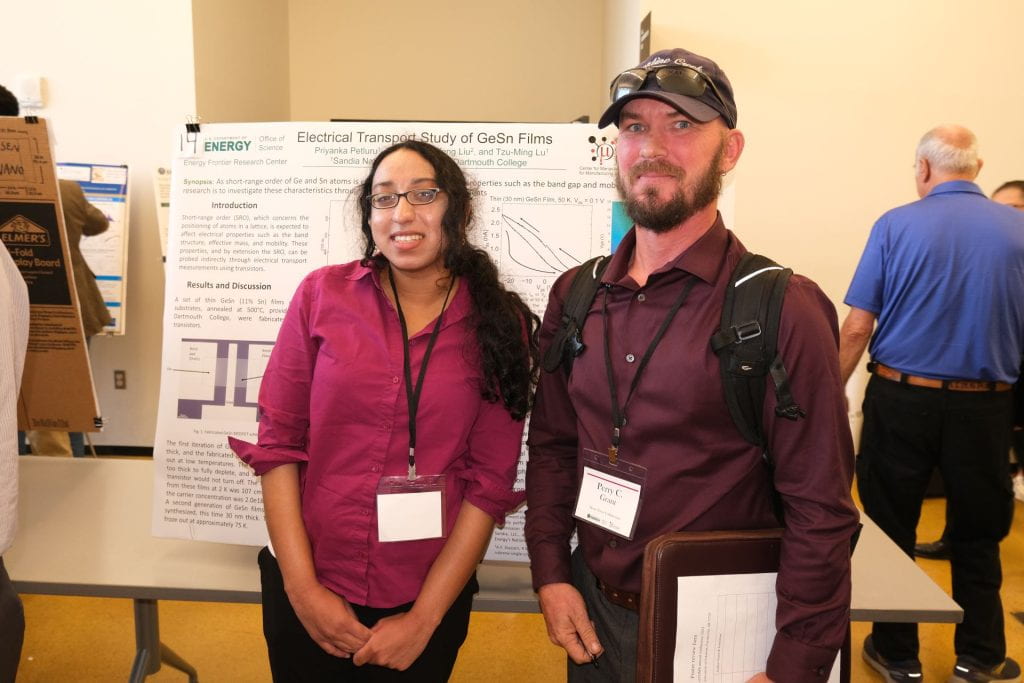
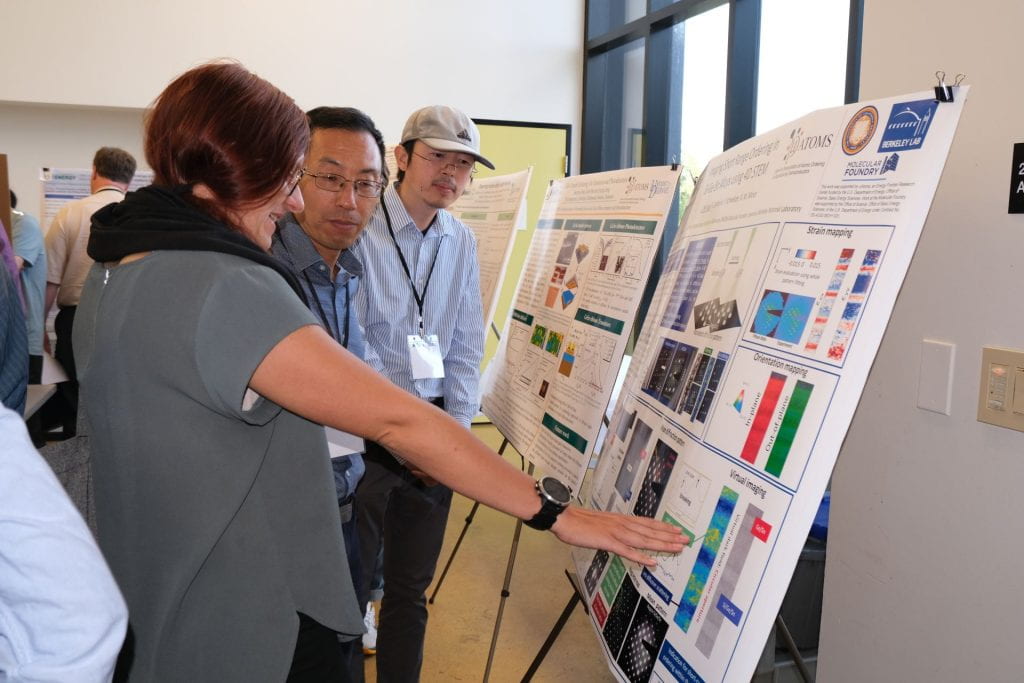
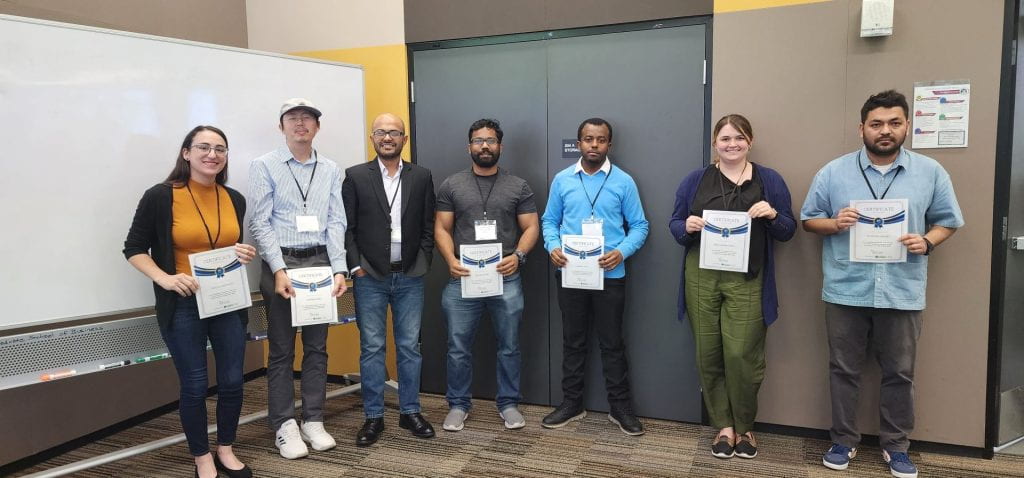
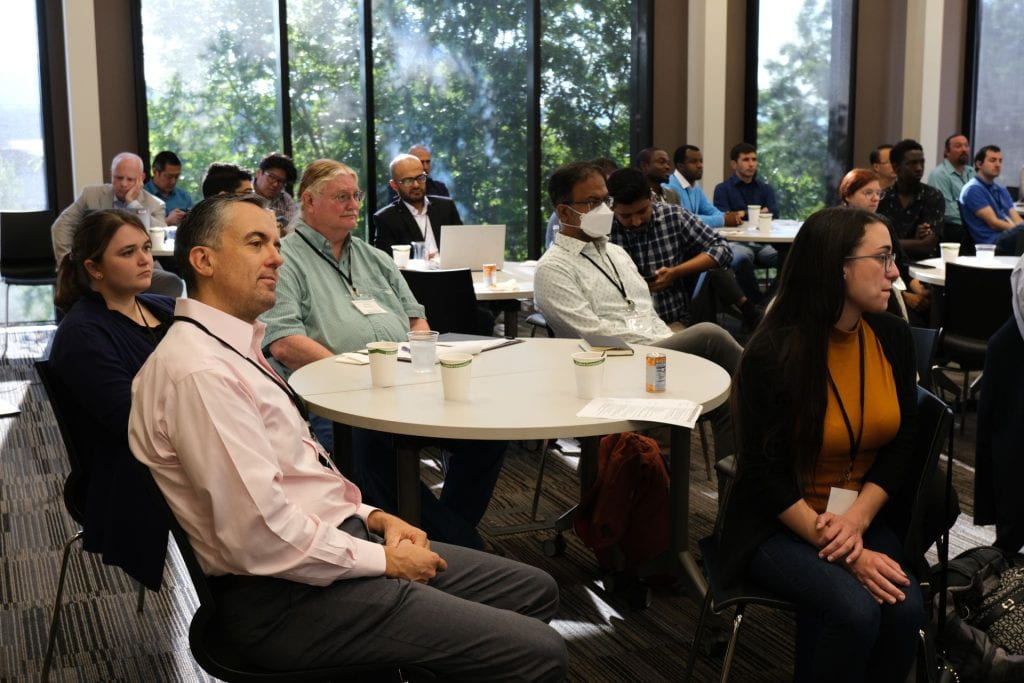
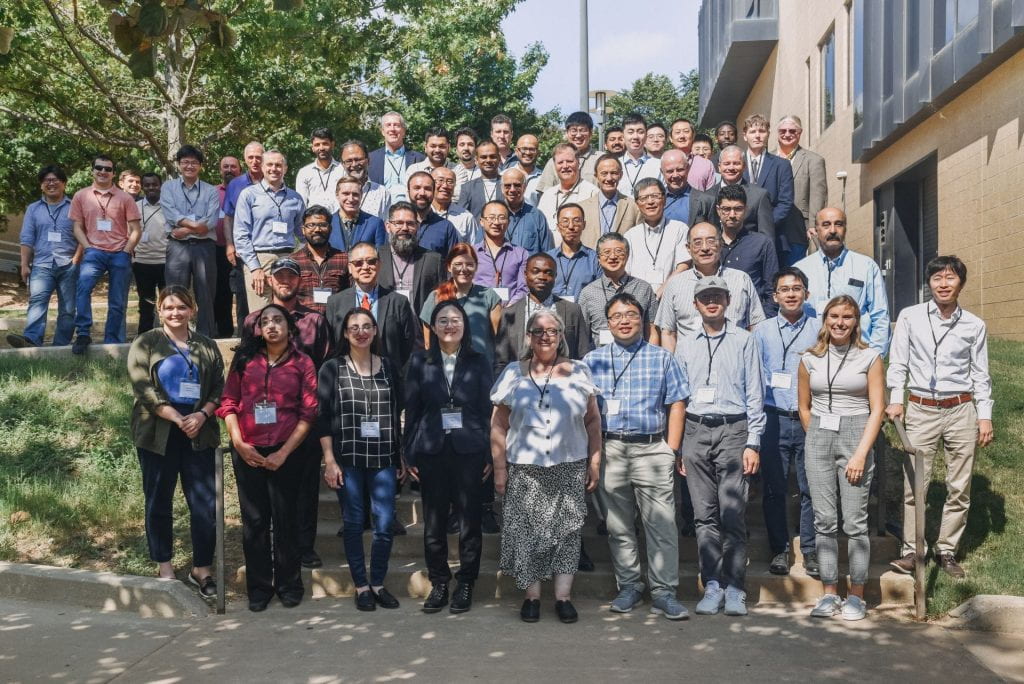
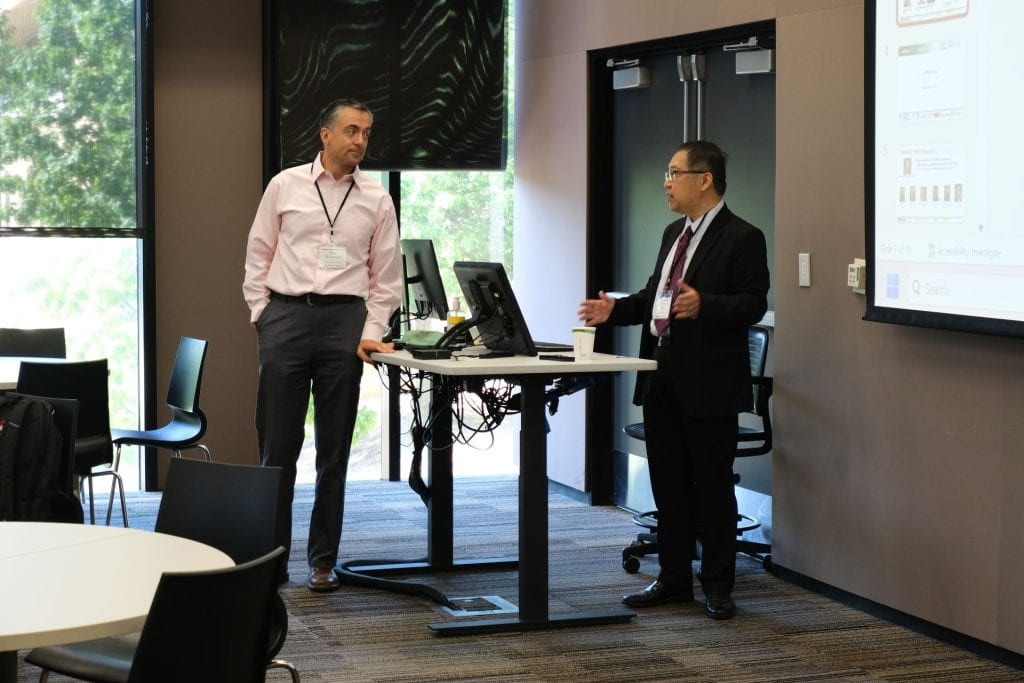
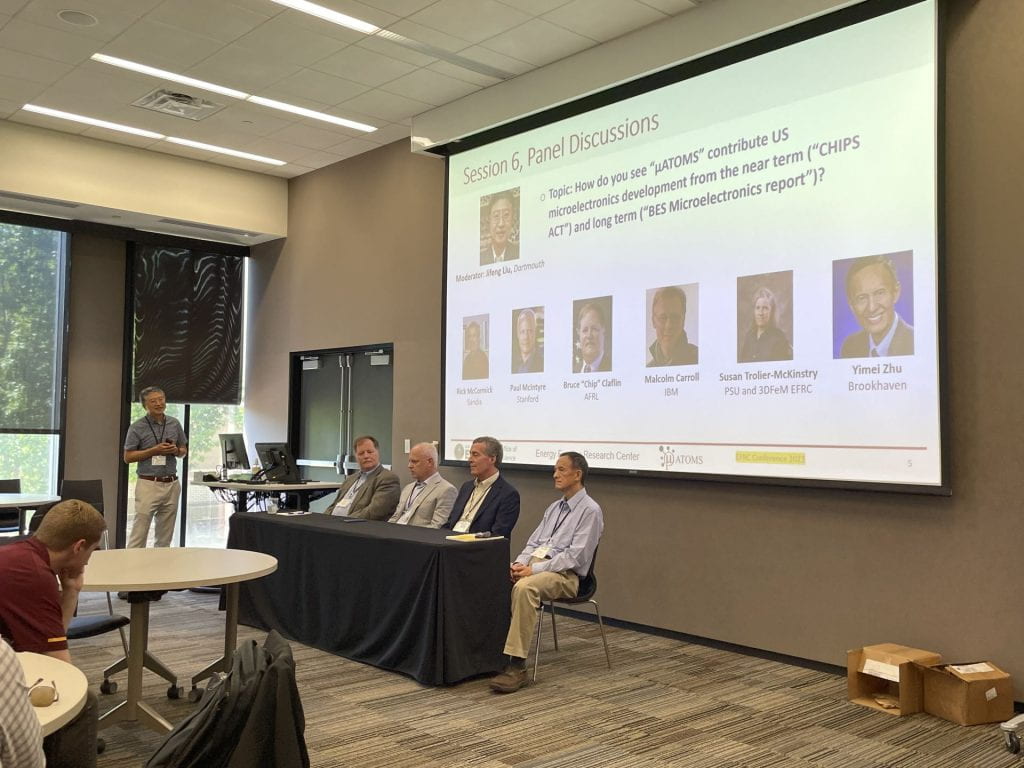
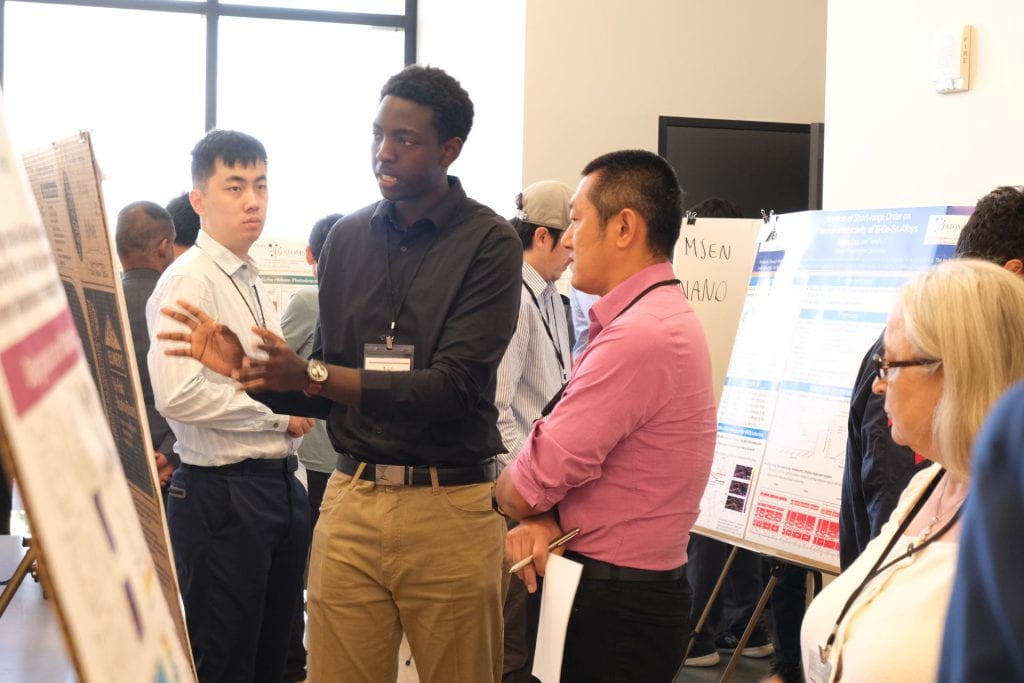
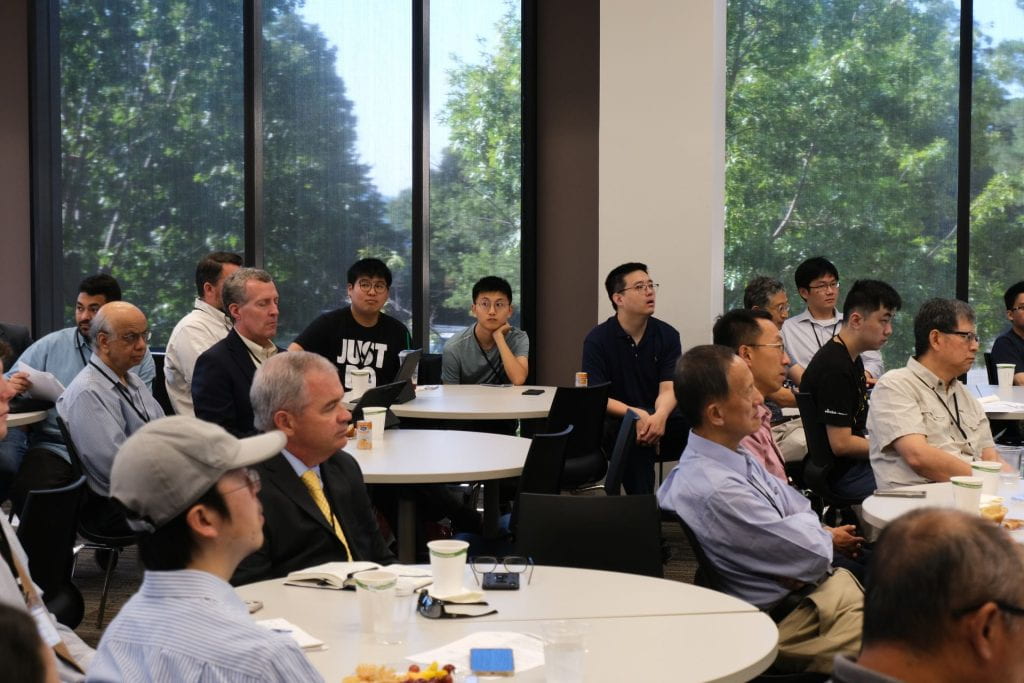
June 2023: Dr. Yuping Zeng (University of Delaware) has been awarded the prestigious NSF Career award.
Dr. Hiro Nakamura (University of Arkansas) has been awarded the DOD EPSCoR award.
May 2023: Physicist Jin Hu (University of Arkansas) has been awarded a second Faculty Early Career Development (CAREER) award, this time from the National Science Foundation. The new award of $579,527 comes two years after Hu received a $750,000 CAREER Award from the U.S. Department of Energy.
April 2023: Xiaochen Jin’s (George Washington University) presentation “Complex Roles and Structures of Short-Range Order in Si-Ge-Sn Medium-Entropy Alloy” is awarded the Best Oral Presentation Award for the Symposium “High-Entropy Materials: From Fundamentals to Potential Applications” in 2023 MRS Spring Meeting!
µ-ATOMS members get together at Tri-service workshop – January 10-11, 2023
A few µ-ATOMS PIs and students gathered in Dayton OH attending the 5th Tri-service workshop orgainzed by AFRL, ONR, and ARO, together with quite a few online participants from our EFRC. We dicussed the development and perspective of GeSn and SiGeSn technology with our colleagues from universities, DoE and DoD labs, and industry.
$10.3 Million Grant Will Establish New Energy Frontier Research Center – September 20, 2022
A team of researchers led by Shui-Qing “Fisher” Yu, electrical engineering professor at the U of A, will receive $10.35 million from the U.S. Department of Energy to establish an Energy Frontier Research Center.
The grant will establish the Center for Manipulation of Atomic Ordering for Manufacturing Semiconductors, the first Energy Frontier Research Center in Arkansas. The center will be dedicated to investigating the formation of atomic orders in semiconductor alloys and their effects on various physical properties.
This research program will enable reliable, cost-effective and transformative manufacturing of semiconductors, the essential material used in computers and other electric devices.
In addition to Yu, the team comprises four colleagues in the Department of Physics — Distinguished Professor Greg Salamo, assistant professor Jin Hu, associate professor Hugh Churchill and assistant professor Hiro Nakamura — and several researchers at other institutions.
The four-year grant is part of the Energy Department’s $540 million in research funding to universities and national laboratories focused on clean energy technologies. The ultimate goal is to create and develop low-carbon manufacturing processes that will reduce greenhouse-gas emissions.
The award is based on the multi-institutional team’s recent discovery that atoms in the alloy silicon germanium tin, a semiconducting material, demonstrate a short-range order in a periodic lattice. Short-range order refers to the regular and predictable arrangement of atoms over a short distance, usually only one or two atom spacings. This discovery had a significant effect on the energy band gap and led to the exciting hypothesis that material properties in semiconductor alloys could be designed and fabricated by manipulating the order of atoms.
“We particularly thank the institutional support from U of A, which played a critical role in proposal completion and will assist center operation,” Yu said.
The U of A will lead researchers from Arizona State University, George Washington University, Stanford University, University of California Berkeley, Dartmouth College, Rensselaer Polytechnic Institute, University of Arkansas Pine Bluff, University of Delaware and Sandia National Laboratory. Reference: University of Arkansas Newswire — Sep 20, 2022












